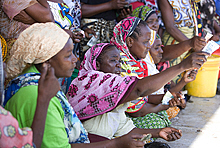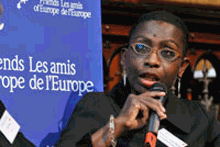
Typical street scene in Santa Ana, El Salvador. (Photo: iStock)
IMF Survey: Sound Policies, Support Can Help Africa Ride Crisis
February 20, 2009
- African countries hit by drop in global demand, remittances, capital flows, aid
- International community can play its part by maintaining aid, trade
- African governments should support demand, keep medium-term goals in sight
IMF Managing Director Dominique Strauss-Kahn said Africa will not be spared the consequences of the global crisis and that the significant gains many countries have made in recent years in the fight against poverty are now at risk.

Market in Dar es Salaam, Tanzania: IMF’s sub-Saharan Africa 2009 economic growth forecast barely covers population growth (photo: Stephen Jaffe/IMF)
GLOBAL DOWNTURN AND AFRICA
“It would be a pity if efforts made during the last years [were to] disappear like snow in the sun just because of the crisis,” Strauss-Kahn said in an interview recorded on February 12.
A year ago, many observers believed the crisis would pass Africa by. Today, however, these assumptions have been proved wrong. “Not only has global demand decreased, but remittances have decreased, capital flows have dried up and, on top of that, donor aid may be even less than in the past,” Strauss-Kahn said.
During a meeting in Rome of the Group of Seven (G-7) advanced economies, Strauss-Kahn said he hoped to double the level of concessional resources the Fund has to lend to low-income countries. “We have, more so than in the past, a duty to help these African countries,” he said in the interview.
Slowing growth
Before the global financial crisis, some African countries had started to attract new investment inflows and had begun borrowing on international capital markets. Research by the IMF in September 2008 identified eight countries, beyond South Africa, which could become emerging or frontier markets: Botswana, Ghana, Kenya, Mozambique, Nigeria, Tanzania, Uganda, and Zambia. All these countries had experienced a takeoff in growth, led by the private sector, and had public policies in place that embraced market-led growth, as well as financial markets that attracted foreign investors.
Today, less than half a year later, the outlook is more bleak. With the expectation of a more pronounced global downturn, weaker commodity prices, and pressure on capital flows, the IMF expects growth in sub-Saharan Africa to slow from about 5¼ percent in 2008 to about 3¼ percent in 2009, about 3 percentage points less than projected just four months ago. And for the time being, investor interest in sub-Saharan Africa has cooled off.
“It was said a year ago that African countries were not so linked to the financial system in the West that the effect of the crisis would not be so important. This was wrong. With some delay, they are now being hit by the crisis,” Strauss-Kahn said.
Fiscal space
IMF African Department Director Antoinette Sayeh told African reporters in a February 19 conference call that sub-Saharan Africa was already feeling the impact of the global financial crisis. Sound budgetary policies in recent years, and comprehensive debt relief, meant that some countries have the room for fiscal stimulus without jeopardizing economic stability. In many others, however, financing constraints severely limit the room for maneuver.
Transmission channels
Speaking at the European School of Management in Paris on February 4, Sayeh said that sub-Saharan Africa is being affected by the global economic downturn through a fall in import demand from key markets such as the European Union, the United States, and Asia, and through a slump in commodity prices and scarcer financial flows.
In a presentation on the impact of the world financial crisis on sub-Saharan African countries, Sayeh noted that the IMF’s growth projection for the region for 2009, sharply revised down to about 3.3 percent, barely covered the population growth rate. And although the region’s inflation is falling slowly from a high level, serious effects of the global downturn include emerging fiscal and balance-of-payments pressures, and downside risks.
Sayeh outlined three key tasks for the region’s policymakers.
• Maintain stability and support demand amid reduced external financing
• Reduce vulnerability to financial turmoil
• Keep medium-term goals in sight.
Speaking at the Belgian think tank Friends of Europe on February 5, Sayeh said that African countries should pursue sound policies to deal with the crisis, but the international community had to play its part by maintaining development assistance and guarding against protectionist tendencies.

Sayeh in Brussels: African countries have to pursue sound policies to deal with crisis, but international community has to play its part (IMF photo)
High-level conference
Sayeh’s tour of three European countries, organized to disseminate updated IMF economic forecasts for sub-Saharan African countries, also underscored the IMF’s desire to intensify its policy dialogue with African member countries.
Other initiatives include a conference to be co-hosted by President Kikwete of Tanzania and the IMF in Dar es Salaam March 10–11. The event will bring together policymakers, the private sector, and civil society from Africa and beyond to discuss sustaining and building on Africa's recent economic success.
Strauss-Kahn said he thought the conference could help organize the work that is being done to help Africa deal with the consequences of the crisis. “A conference is only a conference, but a conference can do a lot. It is certainly useful to have in the same place, Dar es Salaam during March 10-11 of this year, a meeting of almost 300 policy makers from all over Africa and others coming from outside, to discuss: What has been done in the past? What are the lessons of the past? And, even more, what can be done in the future?”
The IMF has already increased its financing to the countries most heavily affected by food and fuel shocks back in 2008. Strauss-Kahn announced, at the G-7 meeting in Rome, that he wishes to double the resources the IMF has at its disposal for lending to low-income countries.
The institution also stands ready to provide additional support, including under a new financing mechanism for countries hit by exogenous shocks, to help those whom the global financial crisis has affected most severely. The IMF is also reviewing the architecture of its instruments to better be able to support low-income countries in the current crisis.
Comments on this article should be sent to imfsurvey@imf.org


